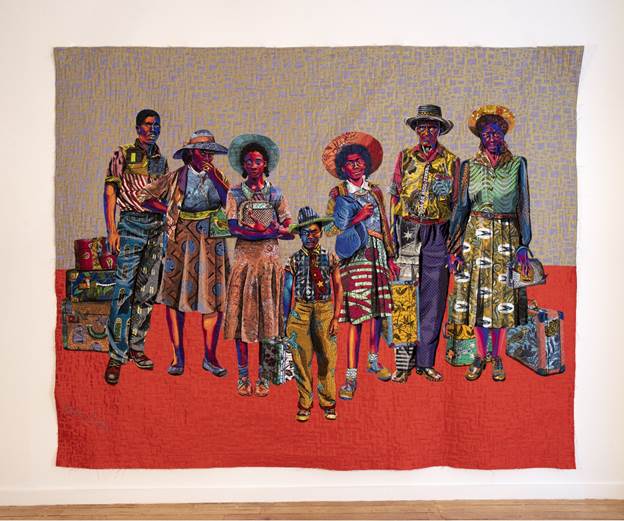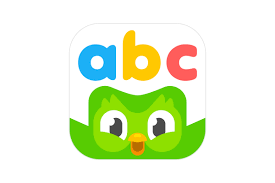The Warmth of Other Sons to be featured in
Virtual Exhibition during the Newark Arts Festival, Oct. 8-11
The Newark Museum of Art, New Jersey’s largest art institution, announced today that it has acquired a large-scale artwork by Essex County resident Bisa Butler, a rising star among contemporary Black artists in the United States, known for her quilted portraits celebrating Black life.
The Warmth of Other Sons is loosely based on source material including historic photographs of Black families that migrated from the South to the North looking for economic prosperity. Standing at 9 feet high by 12 feet wide, this exuberant, multi-layered artwork is a significant acquisition by the Museum and will be included in Art + Tech: Perception, Access, Power, a virtual group show developed in partnership with the Newark Arts Festival, opening on October 8, 2020.
Drawing on a rich history of African American quilters, Butler stitches and layers her portrait quilts using carefully selected fabrics, including, cotton, silk, wool, and velvet. The title of this monumental work is a reference to Isabella Wilkerson’s critically acclaimed chronicle of the Great Migration, The Warmth of Other Suns, published in 2010.
Butler currently resides in West Orange, New Jersey, where she has a well-established studio practice and deep roots in the local community. She is an active member of the Newark arts community and previously taught in the Newark Public Schools for 10 years.
Local art enthusiasts will get an early glimpse of The Warmth of Other Sons virtually during the Newark Arts Festival, from October 8-11. Thereafter, this work will make its debut in Bisa Butler: Portraits, a solo exhibition organized by The Art Institute of Chicago, opening on November 16th. Mid next year The Warmth of Other Sons will return to The Newark Museum of Art where it will be installed in the Museum’s Seeing America galleries.

Bisa Butler, The Warmth of Other Sons, 2020
Velvet, wool, Vlisco cotton, silk, 108 x 104 in.
Collection of The Newark Museum of Art
Purchase 2020 Collections Exchange Fund 2020.1
Photo courtesy Claire Oliver Gallery © Bisa Butler
“Bisa’s art speaks to the deeply layered, complex, and vibrant histories of Black American life and the diaspora. Her work is especially meaningful as the country reckons with long-standing social and economic inequities impacting Black and Brown citizens, now in sharper relief with the impact of the COVID-19 pandemic,” said Catherine Evans, Deputy Director, Collections & Curatorial Strategies at The Newark Museum of Art. “We are immensely proud to bring Ms. Butler’s powerfully affirming artwork into the Museum’s collection.”
Butler was born in Orange, New Jersey, the daughter of a college president and a French teacher. She grew up in South Orange, the youngest of four siblings. Her artistic talent was first recognized at the age of four, when she won a blue ribbon in an art competition.
Butler graduated Cum Laude from Howard University with a Bachelor of Fine Arts degree. It was during her education at Howard that she began to experiment with fabric as a medium and became interested in collage techniques. She then went on to earn a Master of Arts degree from Montclair State University in 2005. A dedicated arts educator, she was a high school art teacher for 13 years, serving for 10 years in the Newark Public Schools and three at her alma mater, Columbia High School in Maplewood, New Jersey.
“Honoring art by local artists and artists of color is a core tenet of this institution,” said Linda C. Harrison, director and CEO of The Newark Museum of Art. “We believe guests of all ages, races, and genders will find inspiration when they see the amazing work from contemporary artists and artists from Black and Brown diasporas. Art can unite people in a way that few other mediums can do, and Bisa’s work is an example of that unification.”
Butler’s work is currently the focus of a solo exhibition Bisa Butler: Portraits at the Katonah Museum of Art in New York, which remains on view through October 4th. That exhibition will then travel to the Art Institute of Chicago this fall. In addition to The Newark Museum of Art, her works are included in the collections of the Art Institute of Chicago; Minneapolis Institute of Art; Museum of Fine Arts, Boston; Nelson-Atkins Museum of Art; The Toledo Museum of Art; and Orlando Museum of Art, among others.
In 2019, Butler was a finalist for the Museum of Arts and Design’s Burke Prize. Her portrait of Nobel Peace Prize Laureate Wangari Maathai was featured as a cover for Time magazine’s special issue honoring the 100 Women of the Year in 2020.


















